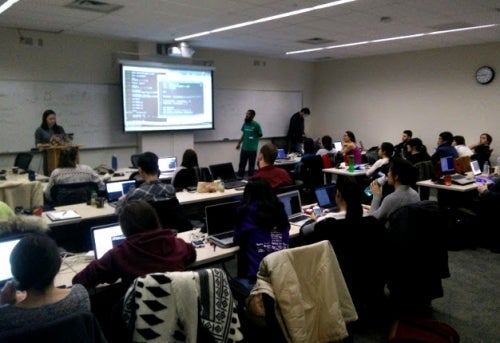Tuesday, April 26, 2016
Programming
and
understanding
of
how
computers
work
has
traditionally
been taught
in
computer
science
courses.
However,
knowing
how
to
make
computers
do automatic
and
repetitive
tasks
makes
everyone
more
efficient
in
their
studies, research
or
workplace.
The
primary
goal
of
the
programming
workshop,
organized at
the
university
by
Women
in
Computer
Science
and
supported
by
the
Python Software
Foundation,
was
to
make
this
knowledge
accessible
to
everyone.

The
three
day
workshop held
in
January
2016,
sparked
a
great
interest
among
students,
staff
and
faculty
members.
Thirty-two
participants
were
selected
among
345
applicants,
resulting
in
a
diverse
group
of
students
from
various
departments
such
as
arts,
environment,
science
and
applied
health sciences.
All
participants
were
complete
novices
and
had
no
prior
programming experience.
Together
with
a
group
of
six
student
mentors
and
two
student instructors,
participants
learned
basic
programming
concepts
through interactive
lectures,
quizzes,
projects
and
individual
instruction
using
the Python
programming
language.
Participants
started
by
learning
programming basics
such
as
data
types,
variables,
conditionals
and
program
flow
control.
The
curriculum also
covered
advanced
data
types
and
concepts
such
as
using libraries
written
by
other
programmers
to
analyse
the
data
on
historical temperature
changes.
After
three
days,
the
participants
with
no
prior programming
knowledge
were
able
to
write
a
script
which
extracts
and
processes the
data,
allows
them
to
answer
their
questions
about
the
data
and produces
figures
ready
to
be
included
in
their
papers,
reports
or theses
within
just
a
few
hours.
All
participants
would
recommend
the
workshop
to
others
and
over
80%
rated
the
workshop
as
excellent.
Learning
how
to
code
was
challenging,
but
with the
support
of
mentors
and
instructors
they
felt
encouraged
and
excited
to apply
the
knowledge
in
the
project
and
later
in
their
own
research.
Overall,
the
workshop
was
an
enjoyable
learning
experience
for
everyone
involved,
showing
that
coding
and
learning
how
to
code
is
an
exciting
and
fun activity.
